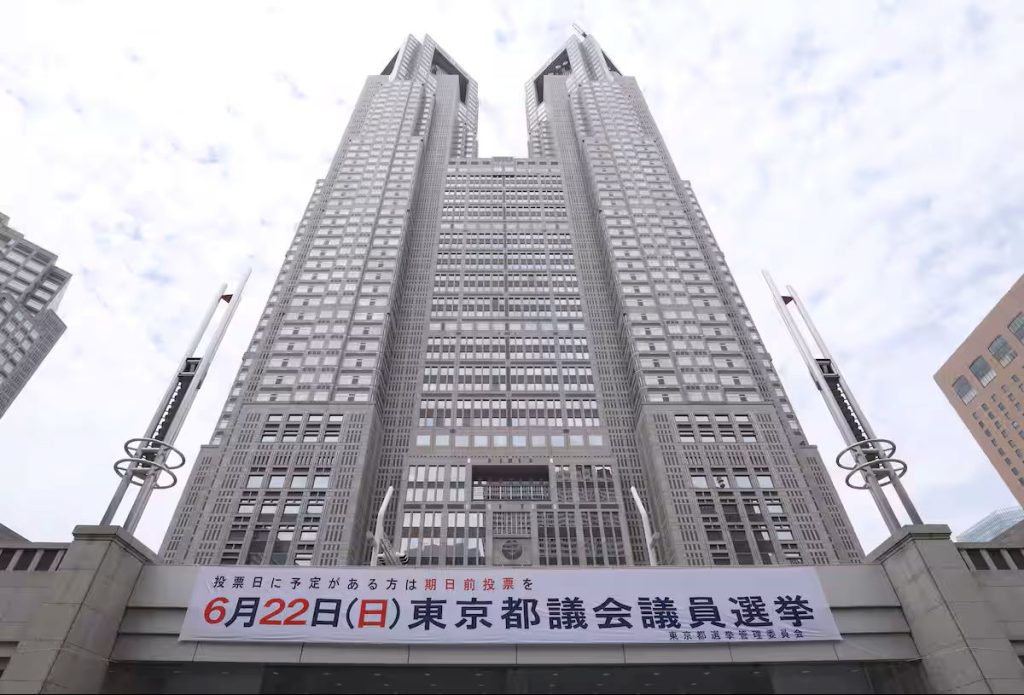
A banner announcing the Tokyo Metropolitan Assembly election hangs in front of the Tokyo Metropolitan Government Building in Shinjuku, Tokyo. (©Sankei by Kajiyama)
このページを 日本語 で読む
The next election for seats in the Tokyo Metropolitan Assembly was announced on June 13. Voting will be held 10 days later on June 22. While this election is widely viewed as a warm-up for the nationwide summer House of Councillors (Upper House) election, Tokyo, the nation's capital, faces a wide range of challenges of its own.
Disaster prevention and measures to combat declining births are high priorities. Policies made in Tokyo have an impact on local governments around the country. Therefore, we would like to see a sincere and informed policy debate.
Approximately 300 candidates are expected to run for the 127 seats up for grabs in the metropolitan assembly election. Every party has pledged to combat the recent rise in prices by promoting wage increases, advocating support for household finances, and subsidizing rent. However, all of them need to clearly explain the effectiveness and feasibility of the policies they advocate. They must especially let voters know how they will secure the financial resources to carry out their proposals.
Mid- to long-term policies addressing these problems cannot simply be left until later. To start, there needs to be a thorough discussion about disaster prevention measures, which are directly related to the lives of Tokyo residents.
Protecting the Public, Preserving Order
According to the Tokyo Metropolitan Government's own projections, if a major earthquake were to occur directly beneath the capital, approximately 100,000 people would be killed or injured. Another roughly three million people would be forced to evacuate.
Additionally, there is concern that Mount Fuji could erupt at any time. In such an event, large amounts of volcanic ash could paralyze city functions. How should we deal with such situations?
Furthermore, there is a need to expedite the construction of underground or air raid shelters in preparation for emergencies.

Maintaining public order in the capital also requires stronger measures against illegal residence and employment of foreigners. Accordingly, measures regarding foreigners are expected to be included in the central government's basic policy. Hopefully, there will be coordination at all levels of government while addressing these problems.
Tackling Population Issues
Policies to deal with declining births also need to be thoroughly addressed and aired with the public. According to the 2024 Vital Statistics, Tokyo's "total fertility rate" fell below 1.0 for the second consecutive year. That made it the lowest among all of Japan's prefectures. Tokyo Governor Yuriko Koike is tackling this problem. Nevertheless, it is also the role of the metropolitan assembly to ascertain whether the support measures for child-rearing she is promoting are appropriate.
Another topic requiring attention is how election campaigns are conducted. There were several notable problems during the Tokyo gubernatorial election in July 2024. For example, there were numerous instances where election notice board squares for candidate flyers were plastered instead with images of animals and nearly naked people.

While not in Tokyo, there were also problems during the Hyogo Prefecture gubernatorial election in November 2024. Those included rampant slanderous attacks on and false information about candidates on social media.
Fair, orderly elections are a pillar of democracy. Anything that undermines that ideal cannot be tolerated.
Getting Out the Vote
Increasing voter turnout is another challenge, especially among younger voters. Consider turnout in the past three metropolitan assembly elections. Overall turnout was 43.50% in 2013, 51.28% in 2017, and 42.39% in 2021. But among voters in their twenties, the turnout was less than 30% in all cases.
Tokyo has a population of approximately 14.2 million, and its total budget for fiscal year 2025 is ¥17.8 trillion JPY ($123.5 billion USD). Everyone must bear in mind that whether or not residents can live safely in Japan's capital in the end depends on the choices made by voters.
RELATED:
- Urgent Need to Involve More Young Voters after General Election Turnout Was Dismal
- Reclaim Your Right to Vote in this Centennial Year
- Let the October 31 Polls Be A Reminder: Democracy Didn’t Come to Japan Only After the War
Author: Editorial Board, The Sankei Shimbun
このページを 日本語 で読む








